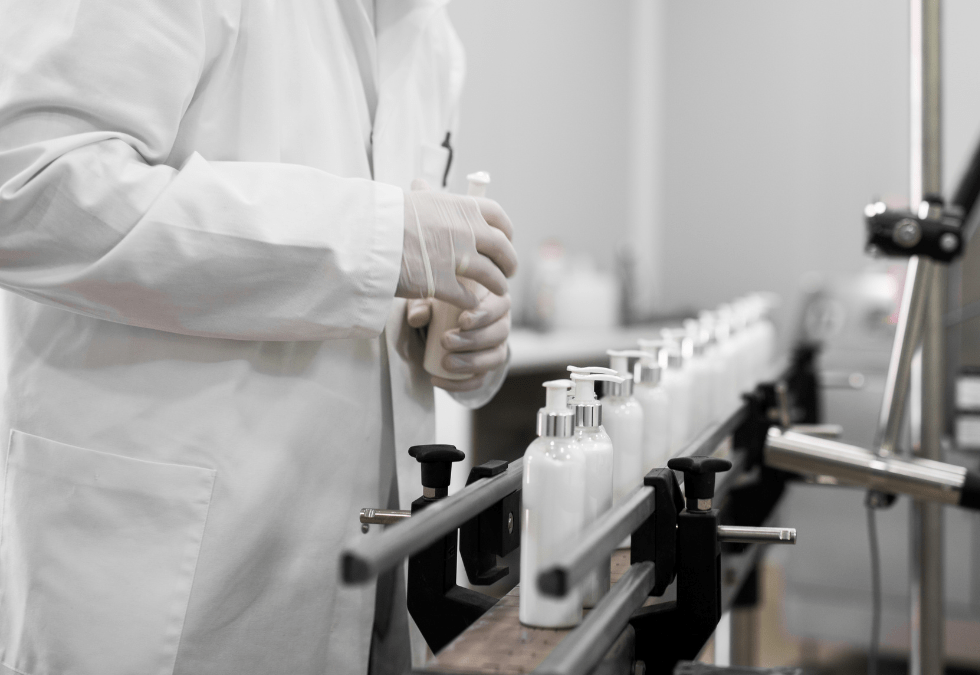Cosmetics manufacturing is a very complicated process. A cosmetics manufacturer must not only use appropriate technology, but also comply with a number of legal requirements.
Table of contents
- Cosmetics production planning and logistics
- Manufacture of cosmetic material
- Cosmetics packaging, or the final stage of manufacturing
- Summary of the cosmetics manufacturing process
Cosmetics production planning and logistics
Developing a suitable formula for the product is, of course, the first step in the production process. The formulation must not only be efficient, but also safe for its intended users.
In the next stage, a cosmetic manufacturing company should design appropriate packaging and labelling. Given that the packaging must ensure sufficient protection and a tight seal, the type of container depends on the category of cosmetics products that the product falls under.
The next step for the cosmetic manufacturing company in planning the cosmetic manufacturing process is to conduct the necessary tests to verify that the final product is safe for use. These include dermatological and application tests. The cosmetics are assigned an expiry date based on their composition and packaging.
Making sure that there is a sufficient supply chain for the raw materials required to manufacture the product is the next step in planning the production process for cosmetics products. Even the best and most cutting-edge cosmetic line will be useless without the right manufacturing materials.
It is also critical for the production process to properly plan how the finished products will be stored and transported. Every cosmetic manufacturing company should become familiar with the stringent regulations for the storage and transportation of products of this type at an early stage in the planning of the cosmetic manufacturing process.
The cosmetic industry usually uses the FEFO (First Expired First Out) goods management principle in the storage of finished goods from the production process. As the acronym suggests, this involves running the warehouse in such a way that the items with the shortest expiration date leave it first. Therefore, it is crucial to design the warehouse for optimised free access to each batch of stored goods and easy control over the expiry dates of cosmetics products.
The quality and shelf life of cosmetics are greatly influenced by the storage conditions in which they are kept. It is particularly important to maintain the right levels of humidity, temperature and UV radiation.
Manufacture of cosmetic material
Once the production process has been properly planned and all the legal requirements for the cosmetic itself, as well as for its storage or transport, have been met, the cosmetics manufacturing unit can move on to the stage of the cosmetics manufacturing process, which is the manufacture of the cosmetic material.
A number of various requirements for the cosmetic manufacturing process must also be met at this stage. First of all, the facility where the cosmetic material is produced must meet minimum standards for cleanliness. There are special clean zones on the premises that can only be entered by authorised personnel wearing clothing that has undergone cleanliness tests.
Every cosmetic manufacturing company compiles detailed hygiene plans that specify the permissible limits and the procedures to be followed in the event that they are exceeded.
The production of cosmetic material in the cosmetic line is carried out by specialised machinery known as mixers. Depending on their use and the scale of the cosmetic manufacturing process, the cosmetic industry uses various types of mixers.
Non-pressure mixers with a single central stirrer are the simplest mixers that can be found in the cosmetics line. The most complex ones include homogenising mixers, which come with a full range of stirrers and sophisticated controls.
No matter the type of design, the ability to clean both the mixer and the tank quickly and easily should be a standard feature of any mixer used in the production process, as any cosmetics manufacturing unit must meet cleanliness standards for both the premises and the equipment.
Cosmetics packaging, or the final stage of manufacturing
Packaging is the last step in the cosmetics manufacturing process. What does this phrase mean? Of course, it refers to pouring the finished product into individual bottles, jars, or flasks. The packaging must also be labelled during this process. The last items in every cosmetic line are packaging devices like pouring, capping, and labelling machines.
Strict standards for cleanliness and hygienic practises must also be met during this phase of the production process. For this reason, designers of packaging machines must make sure that their products are not only reliable and functional, but also easy to clean and resistant to the various kinds of disinfectants used to clean the cosmetic line.
Quality control is also typically done at the packaging stage. Packaging is examined to make sure that it is correctly filled, that the cap is sealed, that the label is placed correctly and that the printing on the label is up to standard.
Summary of the cosmetics manufacturing process
Any cosmetic manufacturing company should be aware that developing a product formulation is just the start of a long journey, namely the planning of the production process. Before the cosmetic can be marketed, proper packaging must be designed, and the product must go through a number of tests to ensure that it is safe to use. Quality control is key to ensuring that the composition of the finished product matches that of the original formulation.
When planning the cosmetics manufacturing process, it is important to remember that the supply of raw materials required for production must be guaranteed in advance . A number of requirements must be met in order for the finished products to be transported and stored safely. It is important to pay special attention to the strict cleanliness requirements of the production process that every cosmetics manufacturing company must meet at the stage of cosmetic material manufacturing and subsequent packaging into individual containers.
If you’re looking for a manufacturer of machines for packaging cosmetics products, we invite you to visit our website, Unilogo, learn more about our offer and use the contact form. You can be sure that our experts will help you choose a solution that meets all your needs.


